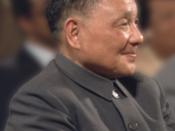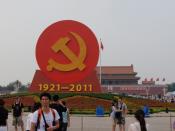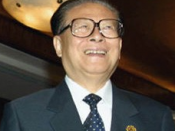In 1989, government corruption and rising inflation caused much of China's population to respond to a student revolt for democracy. This ignited an historically significant confrontation with Chinese Communist Party authorities.
On June 3 and 4, 1989, the Communist People's Liberation Army in China brutally crushed supporters of democracy who marched on Tiananmen Square in Beijing. Hundreds of students and others were killed, with 10,000 people injured and hundreds more jailed.
When Hu Yaobang, a hero to Chinese liberals and a former general secretary of the Chinese Communist Party, died in April 1989, students began peaceful memorial demonstrations in Shanghai, Beijing, and other Chinese cities. ("Tiananmen Square Protest") This tribute evolved into a movement for democracy, as protesters demanded the removal of China's leader, Deng Xiaoping, and other Communist officials.
On April 20, 1989, the Chinese government ordered the protesters to stop demonstrating, an order which the protesters ignored.
On May 4, 1989, 100,000 students and workers marched in Beijing demanding democratic reforms. On May 20, 1989, the government declared martial law. Demonstrations continued, however, while the government tried to decide between two leaders: Premier Li Peng and Chinese Communist Party General Secretary Zhao Ziyang.
Li Peng's harder-line approach won out, as he had Deng Xiaoping's support as well. After Li Peng's appointment, the government ordered troops to Tiananmen Square, where violence ensued. The government conducted widespread arrests, summary trials, and executions; banned the foreign press; and strictly controlled the Chinese press. Although the government had quelled similar protests since the mid-1980s, the extremely violent suppression of the Tiananmen Square protest caused widespread international condemnation of the Chinese government. ("Tiananmen Square Protest")
Now, each year on June 3 and 4, families of the slain protesters gather in Beijing to mourn, although the government has forbidden...


